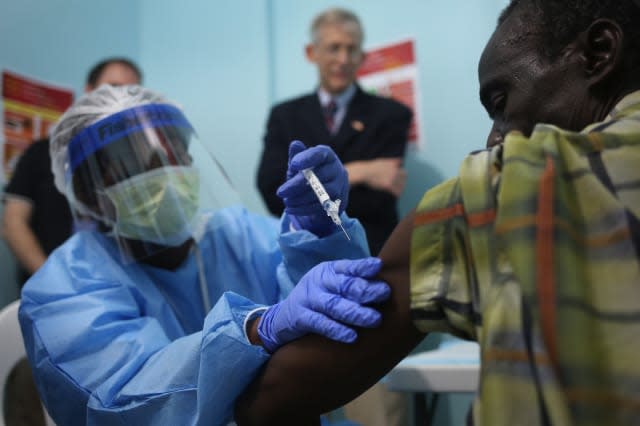Ebola report: Aid chiefs must be more alert over global health scare warnings

Aid chiefs should pay more attention to warnings of global health scares, MPs have said, in a report on the response to the Ebola outbreak.
The UK was praised for its "strong and swift" response once the World Health Organisation (WHO) formally declared an emergency in August 2014 - five months after the first cases.
But the Commons' international development committee said the Government appeared "too reliant" on the flawed WHO system - now being reformed - to trigger full-scale responses.
Groups like Medecins Sans Frontieres had raised the alarm months earlier, it said, concluding the Department for International Development (DfID) "must ensure it has the ability to listen and react to information and warnings from a range of sources".
It was "still relying too much on improvements on the international system without improving its own ability to independently assess international public health risks", the MPs concluded.
The committee also said it should be made easier for small sums of aid funding to be allocated, after hearing from a doctor who was refused £7,500 in the early stages.
An inability to deal with small sums "may have hampered" the response, the report said, cautioning that "playing catch-up" usually proved more expensive.
Committee chairman Stephen Twigg said: "The international community relied on WHO to sound the alarm for an international emergency on the scale of Ebola. The organisation's failure to respond quickly enough is now well documented.
"DfID operated effectively once the international response began in earnest. However, the department should have been able to pick up on warnings from sources beyond the established international system.
"DfID also needs to be more flexible. The Committee heard how £7,500 in June 2014 would have enabled the building of eight isolation units before the cost of treatment escalated.
"Small, early interventions deliver good value for money. Country offices should be able to authorise spending without fear of negative consequences.
"It is vital that these lessons are learned as every delay counts. We urge DfID to lead efforts and make this reform a priority."
A DfID spokeswoman said the department had begun taking action months before the formal declaration - including providing a number of smaller sums to organisations on the ground.
That included £750,000 for MSF in June 2014 for Ebola treatment beds and another £1 million to the Red Cross to raise awareness of Ebola and improve contact tracing.
Grants worth less than £10,000 were also channelled via the Ebola Emergency Response Fund
"Months before the first cases of Ebola were confirmed in Sierra Leone, Britain was at the forefront of tackling this unprecedented epidemic as we simultaneously pushed the international system to respond more quickly," the spokeswoman said.
"From rapidly deploying NHS medics and military personnel to building treatment centres, our swift and effective action helped save thousands of lives and contain the spread of the disease.
"Our flexible response is now ensuring Sierra Leone can isolate and treat new cases of Ebola before they spread."
A woman tested positive for the virus in the country last week, a day after the epidemic was declared over by the WHO, as isolated cases continued to emerge even after countries are said to be Ebola-free.


